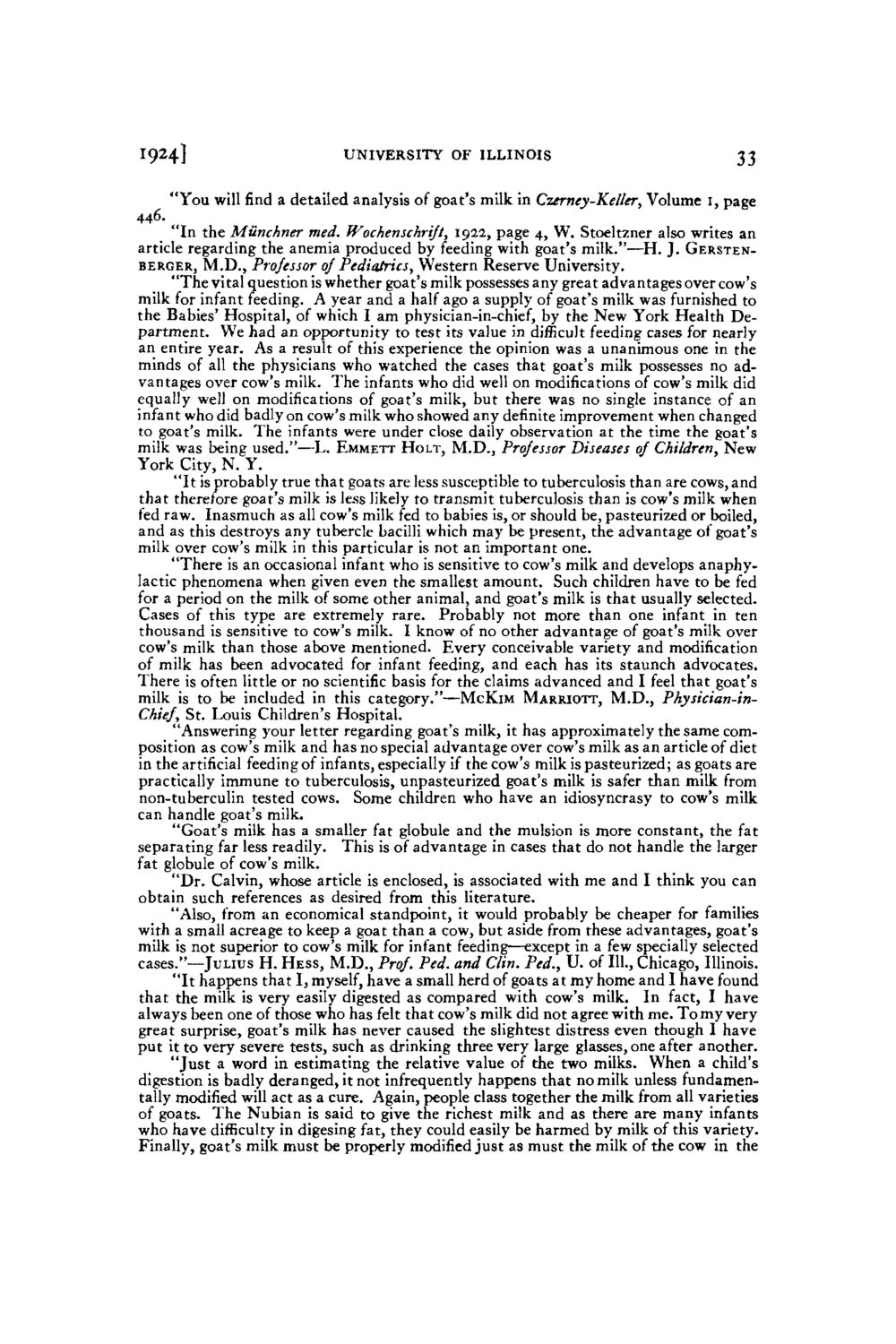| |
| |
Caption: Board of Trustees Minutes - 1926
This is a reduced-resolution page image for fast online browsing.

EXTRACTED TEXT FROM PAGE:
1924] U N I V E R S I T Y OF ILLINOIS 33 " Y o u willfinda detailed analysis of goat's milk in Czerney-Keller, Volume 1, page 446. "In the Munchner med. Wochenschrijt, 1922, page 4, W . Stoeltzner also writes an article regarding the anemia produced by feeding with goat's milk."—H. J. Gerstenberger, M.D., Professor 0/ Pediatrics, Western Reserve University. "The vital question is whether goat's milk possesses any great advantages over cow's milk for infant feeding. A year and a half ago a supply of goat's milk was furnished to the Babies' Hospital, of which I a m physician-in-chief, by the N e w York Health Department. W e had an opportunity to test its value in difficult feeding cases for nearly an entire year. As a result of this experience the opinion was a unanimous one in the minds of all the physicians who watched the cases that goat's milk possesses no advantages over cow's milk. The infants w h o did well on modifications of cow's milk did equally well on modifications of goat's milk, but there was no single instance of an infant who did badly on cow's milk w h o showed any definite improvement when changed to goat's milk. The infants were under close daily observation at the time the goat's milk was being used."—L. E m m e t t Holt, M.D., Professor Diseases of Children, N e w York City, N . Y. "It is probably true that goats are less susceptible to tuberculosis than are cows, and that therefore goat's milk is less likely to transmit tuberculosis than is cow's milk when fed raw. Inasmuch as all cow's milk fed to babies is, or should be, pasteurized or boiled, and as this destroys any tubercle bacilli which m a y be present, the advantage of goat's milk over cow's milk in this particular is not an important one. "There is an occasional infant w h o is sensitive to cow's milk and develops anaphylactic phenomena when given even the smallest amount. Such children have to be fed for a period on the milk of some other animal, and goat's milk is that usually selected. Cases of this type are extremely rare. Probably not more than one infant in ten thousand is sensitive to cow's milk. I know of no other advantage of goat's milk over cow's milk than those above mentioned. Every conceivable variety and modification of milk has been advocated for infant feeding, and each has its staunch advocates. There is often little or no scientific basis for the claims advanced and I feel that goat's milk is to be included in this category."—McKim Marriott, M.D., Physician-inChief, St. Louis Children's Hospital. "Answering your letter regarding goat's milk, it has approximately the same composition as cow's milk and has no special advantage over cow's milk as an article of diet in the artificial feeding of infants, especially if the cow's milk is pasteurized; as goats are practically immune to tuberculosis, unpasteurized goat's milk is safer than milk from non-tuberculin tested cows. Some children w h o have an idiosyncrasy to cow's milk can handle goat's milk. "Goat's milk has a smaller fat globule and the mulsion is more constant, the fat separating far less readily. This is of advantage in cases that do not handle the larger fat globule of cow's milk. "Dr. Calvin, whose article is enclosed, is associated with m e and I think you can obtain such references as desired from this literature. "Also, from an economical standpoint, it would probably be cheaper for families with a small acreage to keep a goat than a cow, but aside from these advantages, goat's milk is not superior to cow's milk for infant feeding—except in a few specially selected cases."—Julius H . Hess, M.D., Prof. Ped. and Clin. Fed., U. of 111., Chicago, Illinois. "It happens that I, myself, have a small herd of goats at m y home and I have found that the milk is very easily digested as compared with cow's milk. In fact, I have always been one of those w h o has felt that cow's milk did not agree with me. T o m y very great surprise, goat's milk has never caused the slightest distress even though I have put it to very severe tests, such as drinking three very large glasses, one after another. "Just a word in estimating the relative value of the two milks. W h e n a child's digestion is badly deranged, it not infrequently happens that no milk unless fundamentally modified will act as a cure. Again, people class together the milk from all varieties w h o havegoat's Nubiandigesing fat, they could easilyas must as there arethethis infants Finally, The milk must be properly the richest milk harmed milk of m n y in the of goats. difficulty in is said to give modified just be and the by milk ofa cow variety.
| |